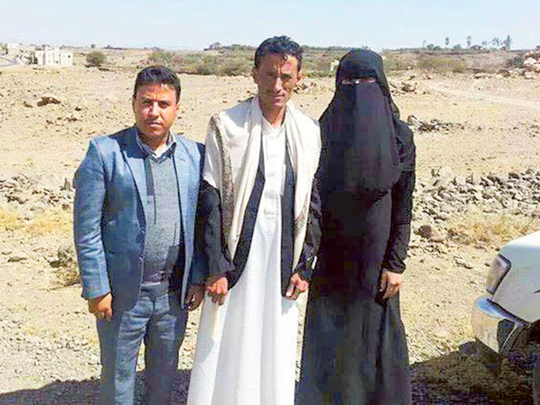
Sana’a: The Saudi woman who fled her home last year to marry her lover in Yemen finally fulfilled her dream in a remote area outside the Yemeni capital last week.
A government official at the ministry of human rights who visited the couple told Gulf News that a local tribe assisted the lovers in their efforts to tie the knot on November 7 and provided them with accommodation and money.
Abdul Salam Al Nawab, the head of the ministry’s refugee department, said the tribesmen are keeping the honeymooners in an undisclosed location, adding that he was blindfolded when he visited the couple in their new house.
A year ago, the Saudi woman Huda Al Jiran, fell in love with Yemeni mobile phone seller, Arafat, in her home city Jizan.
She defied her family and slipped away into neighbouring Yemen when her father blocked her wish to marry Arafat.
The woman’s story went viral when the Yemeni authorities arrested the two lovers and put them on trial. They were later acquitted of all charges.
“When I rang Arafat’s mobile, a man responded and asked me to wait in a certain place in Sana’a and he would come and pick me up,” Al Nawab said.
The armed men covered Al Nawab’s eyes and took him to an unknown area nearly two hours drive from the capital and placed him in front of the couple.
Safety
“I think the couple live in Amran province. I have been to the same area many times. The tribes told me that they hide the lovers’ whereabouts for their safety.”
The northern province of Amran has been under the control of Al Houthi rebels since July.
On November 5, local media reports said that a number of armed men stormed Huda’s accommodation in the capital Sana’a and took her to an unknown destination.
The director of Amal House for women and juveniles, where Huda was staying, told reporters that the armed men introduced themselves as Al Houthis.
“The tribesmen denied that the captors were members of the Al Houthi movement,” Al Nawab said.
The official said that the tribesmen told him that they felt sympathy with the Saudi woman when she was appealing to them in the court to help her marry Arafat in Yemen.
‘Treated with dignity’
Neither Arafat nor Huda were available for comment, but Al Nawab said that Huda told him she was happy with Arafat and did not wish to return to Saudi Arabia.
“Huda told me that she is being treated with dignity by the tribe’s leaders. She told me that she wished to change her name from Huda to Intesar,” meaning ‘victory’.
Huda and Arafat’s ordeal received world attention and prompted international human right watchdogs to urge the Yemeni authorities to protect the woman.
Huda crossed the Yemeni side of the border with Saudi Arabia in October last year when her family refused to allow her to marry Arafat and insisted in marrying her off to her cousin.
The Yemeni security forces arrested her and sent her to the capital to stand trial for illegally entering the country.
Arafat was also accused of helping her cross the border. Saudi media outlets quoted Huda’s father as saying that Arafat cast a magic spell on her and kidnapped her.
At the same time, the Saudis pushed to bring the woman back to her family and appointed a lawyer to defend the woman. Huda refused the embassy’s lawyer and agreed to be represented by a Yemen lawyer sent by a local human rights organisation.
Refugee status
During the trial sessions, sympathisers protested outside the court demanding Huda and Arafat’s release. The woman was recognised as a refugee in November last year by the office of the United Nations High Commissioner for Refugees (UNHCR) in Sana’a.
The woman and her lover were subsequently released and she was sent to Amal centre.
Huda’s ordeal prompted Human Rights Watch into urging the Yemeni authorities not to send back Huda to Saudi Arabia, citing fears from “life-threatening-family violence”.
“Yemeni authorities should not return a Saudi woman to her country without considering her claim that the Saudi government will not protect her against life-threatening family violence,” the watchdog organisation said in a statement in November 2013.












